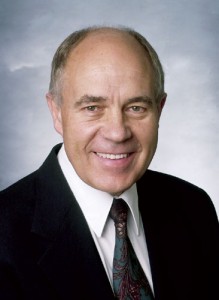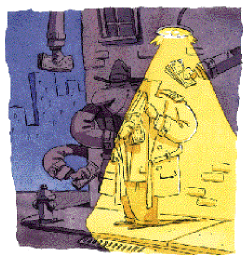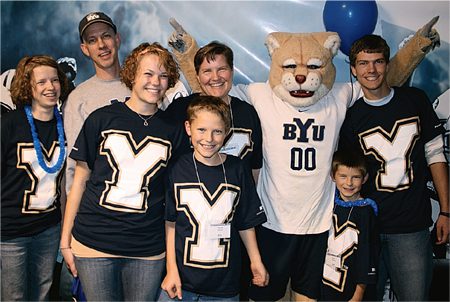By R. Kent Crookston, ‘68
I am an agronomist. Most of my research has been done in the field, where I have studied the workings of nature. Over the years I have come to appreciate that Mother Nature operates on the basis of rather firm laws and that our lives go better when we comply with her principles.
It is about the laws of Mother Nature’s father that I will speak today. We could refer to Mother Nature’s father as Grandfather Nature, but we usually call Him God. The Doctrine and Covenants explains that “when we obtain any blessing from God, it is by obedience to that law upon which it is predicated” (D&C 130:20–21).
One awesome blessing from God is described in the oath and covenant of the priesthood (D&C 84). The Lord explains that when we receive the priesthood, we actually receive Him, and that we receive Him by receiving His servants. And if we receive the servants of the Lord, we receive the Father’s kingdom and all that the Father has (see 84:35–39). I will explore the workings of this oath and covenant with several stories.
The first is the story of David and King Saul. David was loved throughout all Israel for his heroic acts and conduct. Saul had grown jealous of David and sought to kill him, causing David to flee into the wilderness. One day, while hunting for David, Saul sought rest in the very cave in which David and his men were hiding. Observing Saul’s vulnerability, the men of David said to him, “Behold the day of which the Lord said unto thee, Behold, I will deliver thine enemy into thine hand” (1 Sam. 24:4). What thoughts might have passed through David’s head? He knew that Saul had been rejected by the Lord, and that he, David, had been anointed to replace Saul as king.
The writings tell us that David crept forth and cut off the skirt of Saul’s robe. When Saul departed the cave, David let him go a safe distance and then called after him, holding up the skirt and saying, “My lord the king. And when Saul looked behind him, David bowed himself” (1 Sam. 24:8). Then, realizing that David had spared him, “Saul lifted up his voice, and wept” (1 Sam. 24:16).
The most interesting part of the tale is David’s regret for his action.
And it came to pass afterward, that David’s heart smote him, because he had cut off Saul’s skirt.
And he said unto his men, The Lord forbid that I should do this thing unto my master, The Lord’s anointed, to stretch forth mine hand against him, seeing he is the anointed of the Lord. [1 Sam. 24:5–6]
Are we not impressed with the conduct of David? Frankly, I am awed when I consider David’s example of honoring an anointed servant of the Lord, even when that servant had fallen.
My second story takes place in New Zealand. My missionary companion and I arrived at sacrament meeting one evening to find the chapel completely filled. The branch president was being released. Sitting on the back bench was an inactive member named Jimmy Solomon. Jimmy drove a taxi, and we had seen him on the streets several times, usually with a cigar in his mouth. “Everyone’s here to see the change of guard,” I thought, “even Jimmy Solomon.”
Minutes later I was stunned when the mission president told the congregation that the Lord had called Jimmy Solomon to be the new president. All eyes turned; Jimmy’s head was down.
“Those who feel they can support Brother Solomon in this calling, please indicate with a show of hands.” A few hands went up. “Are there any opposed?” The room filled with hands.
The meeting was adjourned. Those who opposed were invited into the cultural hall to share their concerns. After much discussion Jimmy Solomon was sustained.
About a week later we observed a familiar figure driving a taxi. As he passed by we saw a cigar in President Solomon’s mouth.
I was soon transferred and didn’t see Jimmy Solomon again until I returned to the branch to perform a baptism a year later. Following the baptism the former branch president took us to Jimmy Solomon’s house. The room we entered was bright, warm, and friendly. As I took hold of Jimmy Solomon’s hand, I noticed his face. It radiated. He was enthusiastic about our missionary work, and he talked about his love of the temple.
“What happened?” I asked the good brother when we left Jimmy’s house.
“Well,” he answered, “it was a challenging time for all of us when Jimmy was called. The high priests group got together. We agreed that the Lord must have called Jimmy, because none of us would have ever thought of it. And we determined that if the Lord had called Jimmy, it was our duty to sustain him. We went to him and assured him of our love and support. We volunteered to accept callings.
“Jimmy threw away his cigar and started acting like the leader the Lord knew he was. He went around to all of his beer-drinking buddies and got them started back to church, too. He has taken several of them to the temple. I couldn’t have reached those men. And, as you saw today, we’re building a new chapel. The old one can’t hold all of us anymore.”
The third story is short. We were living in a city where an archbishop of the Catholic Church presided. One morning in the newspaper, I read that the archbishop had been arrested for drunken driving. I was startled. Later that same day one of my graduate students, a Catholic nun, came to my office. Meaning to express concern and empathy, I asked her about the archbishop.
“Oh, the dear, dear man,” she replied quickly. “I have been praying for him ever since we received the news. He is my archbishop. He needs my support.”
No sooner had I registered her sweet, encouraging nature than a disturbing question darted into my mind. How would I have responded had the same news been printed about our stake president and the question been asked of me?
Perhaps this story has made you uncomfortable. For my last story let me be so bold as to move from the archbishop and the stake president to the Prophet Joseph Smith.
I was alone on assignment in Africa. It was late at night. I was reading the book Joseph Smith: The First Mormon. The author had documented the Prophet’s apparently unlawful actions and cover-up associated with the destruction of the Nauvoo Expositor. I checked the references; they appeared solid. A disturbing spirit entered the room. I shut the book and turned out the light. I felt my trust in the prophet being undermined. I lay there for some time, and then, suddenly, all the noises of my mind fell silent. And into the silence there came what I could best describe as a scolding.
“So,” the words said, “you feel to rebuke the actions of the Prophet, do you? Shame on you. What do you suppose you would have done had you been in charge in Nauvoo during those grim days? How would you have dealt with the apostasy, enmity, slander, and unending threats on your life? You expected perfection. You know better than that. Jesus was perfect; Joseph was not. What imperfection would you have chosen for Joseph? Go ahead, you choose. What inadequacy would you accept?”
The scolding continued. “Your problem, young man, your biggest challenge in your Church life, will be to accept those turkeys they call to preside over you at the local level. ‘Turkeys’ is what you will be inclined to call them because they will make mistakes—some disturbing ones. Your test will be to overlook imperfections, especially in those who appear to you to be less qualified for office than you think you are. Now get down off your high horse and start being thankful for the life of an imperfect man who, as a prophet of God, has blessed and inspired millions, including you.”
The words stopped. I slipped out from under my covers and began pouring out a prayer of thankfulness for the Prophet Joseph Smith and for other Church and civic leaders who had labored in my behalf.
Servants of the Lord are all around us. We have the opportunity to receive them every day. I testify that when we receive the Lord’s servants we are in compliance with one of the laws of Grandfather Nature and that this compliance makes us more Christlike and qualifies us to receive the awesome blessing of all that the Father has.
Related Article: Utter Dependence on Christ
R. Kent Crookston is the dean of the College of Biology and Agriculture at BYU. This article is adapted from a devotional address given March 20, 2001.
web: The complete text of this speech is available at speeches.byu.edu.










